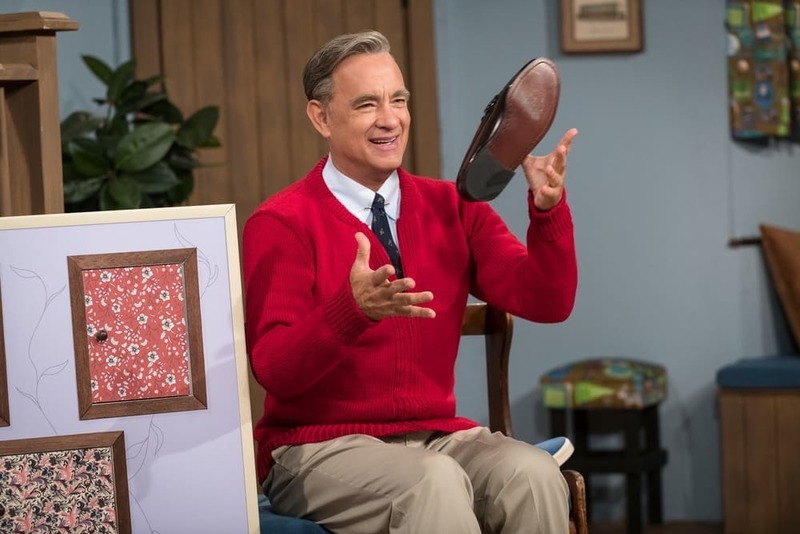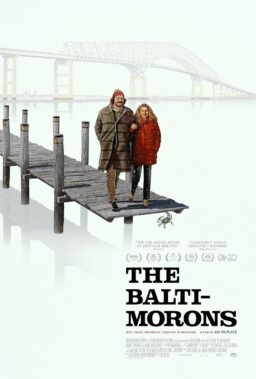“A Beautiful Day in the Neighborhood” is not just a love letter to Mr. Rogers. It is a love letter from Mr. Rogers to all of us, the same reassuring message of friendship and kindness Mr. Rogers delivered to a generation of children through his PBS series. In one scene, passengers on a New York Subway car recognize Mr. Rogers (played by Tom Hanks) and all start singing the theme song that lends its name to the movie. Audiences might find themselves singing along. Screenwriters Micah Fitzerman-Blue and Noah Harpster and Tom Junod, the journalist whose profile of Fred Rogers inspired the film, spoke to rogerebert.com about Rogers’ “compulsive intimacy” and gift for “profound listening.”
You did something very unusual and very brave in the film, a minute of silence, much of it just on Tom Hanks’ face.
Noah Harpster: Right at the camera.
Micah Fitzerman-Blue: We tried in this movie to capture the spirit of Fred Rogers. Everything you read about him, everything that Tom experienced with him, showed that he was compulsively and confrontationally intimate. We wanted to give our audience that experience of doing what Fred had done with crowds. Often when Fred was accepting an award he would turn it back on the people who had given him the award and ask for that moment of silence to think about those who “loved us into being.” Cinematically, it was a risk. Can you ask an audience to sit there and think about someone who they love, someone who loved them into being? We felt at the end of the day that it wasn’t worth making the movie if we couldn’t give them that.
Tom, the movies shows your character (played by Matthew Rhys and called Lloyd in the film) frustrated by trying to get answers from Fred Rogers for your story. Did he ever answer any of your questions when you were interviewing him for Esquire?
Tom Junod: No, especially not the personal questions. But we became friends and spent a lot of time together after the interview. This summer I found a trove of my old emails with him and he would answer questions about faith and about God and about the nature of God and about politics and stuff. He would in email form answer questions but in person it was very much like the movie depicts.

The kinds of questions he asks you in the film about your childhood are like the questions you might get from a therapist.
TJ: Yes, he was like a roving therapist. I think he saw it as his ministry; there was no doubt in my mind that he was never proselytizing. His ministry was something I think beyond that, it was definitely non-sectarian but it was really a potent force in his life.
MFB: It’s like an emotional flash mob.
NH: He was a profound listener. Many people told us that when he asked you a question he would wait until you answered it, like really answered it.
TJ: One of my favorite parts of the movie is when Lloyd asks him about his relationship with his sons. It is just so potent because of that. He goes silent for a while, then he thinks and he says, “Thank you very much for asking that question,” and then “it was hard.” That has a lot of force for sure for me.
Did I glimpse the real-life Mrs. Rogers in the Chinese restaurant scene?
NH: Yes, Joanna Rogers is there, and other people from Fred’s life. Bill Isler is there, Margy Whitmer was also there.
MFB: Hedda Sharapan who directed so much of the academic underpinnings of the whole series; the whole team and Mr. McFeely, David Newell was also there.
How has Mr. Rogers influenced the way you respond to people, either at work or at home?
TJ: I always loved talking to people. But I had a friend who used to kid around with me saying “You’re the guy I don’t want to see at my door knocking,” because my stories were pretty rough; I’ve definitely caused people to lose their jobs and so on. I do feel that my experience with Fred has made me much more aware of the human cost and potential of doing an interview. I’ve really come to look at interviews that I do with people as a profound human experience and I try to honor that in the things that I write. I always had a hunch that there was something more going on in an interview than me just asking questions and people answering but Fred’s the person who confirmed that for sure.
NH: Quite literally. One of the first things we were told is that he would go to a knee and talk to a child eye-to-eye, which seemed so simple. Just that simple act of getting down on the level and talking with a child is so meaningful to them. So something as small as that really affected the way in which I was able to communicate with my kids. Also, I think that going through the world open and listening and, for lack of a better word, with kindness actually can have a massive ripple effect.
MFB: When we began this project, Noah had a two-year-old and a toddler. When we were on set last year I had an almost 3-year-old and now I have a baby on the way. Spending ten years steeped in Fred Rogers has made parenting seem a little less impossible and as Noah. My instinct whenever my kid cries would be to say, “Don’t cry, it’s okay don’t cry.” That is so anathema to what Fred taught which is actually, “No, let’s let me as a parent make it safe for you to have feelings and let me honor your feelings.” And not deny them and not try to fix them but just to be a place where they’re held safely. That for me is of all the lessons that Fred has taught is the one that I try to practice every day — with moderate success.
NH: And also I’ll say that’s the opposite of what we were taught being a man is; the exact opposite which is like: fix it, make everything better. There’s a problem-solving like it’s the exact opposite of the masculinity that we’re taught that has value.
You worked on this movie for many years and yet it seems to have come out at just the right time. Do you feel that way?
TJ: If this movie came out five years ago it could be the exact same movie but it would be a different movie. The context of this movie, the political context of the country, the emotional context of the country makes it a different movie; it gives it a different resonance than it ever would’ve had five, ten years ago.












